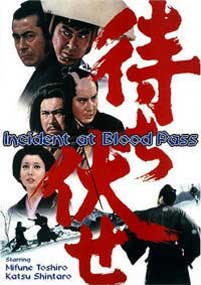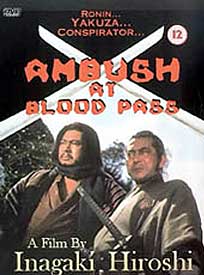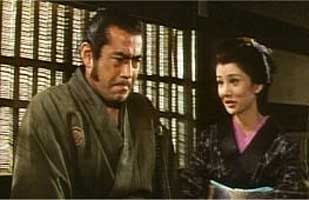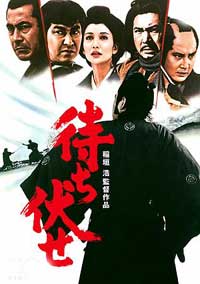 Ambush aka Incident at Blood Pass aka Ambush at Blood Pass (Machibuse, 1970) was a combined effort of the film companies owned by Toshiro Mifune & Shintaro Katsu respectively. Each actor agreed to co-star in a feature from his friend's independent studio. Ambush aka Incident at Blood Pass aka Ambush at Blood Pass (Machibuse, 1970) was a combined effort of the film companies owned by Toshiro Mifune & Shintaro Katsu respectively. Each actor agreed to co-star in a feature from his friend's independent studio.
Katsu appeared in Ambush opposite Mifune who reprised his Yojimbo role for the fourth & last time. Mifune in turn appeared in the Katsu production Zatoichi Meets Yojimbo (1970). Both films were archly commercial ventures intended to be risk-free investments. The perfect director for not-art-intended period films was Hiroshi Inagaki, who rarely imposed anything innovative on such old-fashioned films reliant on star power, period glamor. & action.
The third giant actor of the day was Kinnosuke Yorozuya, who plays government agent Heima Ibuki, a weak-willed arrogant samurai who is easily gotten the better of. He arrives on-stage wounded & with a bound criminal in tow (Ryunosuke Yamazaki as Tatsu).
 I'm a big Kinnosuke fan, but I didn't enjoy seeing him playing such a snarky dumbass as Ibuki. But it says something for his egoless ability to vanish into any role he takes, with no requirement that he be a heroic presence. If there could be such a thing as a "method" actor for jidai-geki swordplay cinema, Kinnosuke would be it, as he truly becomes the characters he plays so that as a viewer one can hate him if he's a villain, admire him if he's a hero, & feel his agony if he is tormented. As Ibukie alas he comes close to being a fool easy only to despise. I'm a big Kinnosuke fan, but I didn't enjoy seeing him playing such a snarky dumbass as Ibuki. But it says something for his egoless ability to vanish into any role he takes, with no requirement that he be a heroic presence. If there could be such a thing as a "method" actor for jidai-geki swordplay cinema, Kinnosuke would be it, as he truly becomes the characters he plays so that as a viewer one can hate him if he's a villain, admire him if he's a hero, & feel his agony if he is tormented. As Ibukie alas he comes close to being a fool easy only to despise.
The big characters here are provided by Toshiro & Shintaro. The yojimbo has accepted a commission for what purpose he is not told. He has to be at a certain place at a certain time, where his purpose will be made known. This fraudulant "mystery" views like a hastily drafted script whose authors didn't yet know what the commision was going to be for. In fact the script is credited to four screenwriters, who I can only imagine worked on the script serially trying to make it presentable, never fully succeeding.
 And because the Yojimbo character is a hireling & not the independent guy he was in Kurosawa's Yojimbo & Sanjuro, nor even in Zatoichi Meets Yojimbo, he doesn't have his usual appeal. He's less ronin & closer to flunky vassal posing as a ronin. And because the Yojimbo character is a hireling & not the independent guy he was in Kurosawa's Yojimbo & Sanjuro, nor even in Zatoichi Meets Yojimbo, he doesn't have his usual appeal. He's less ronin & closer to flunky vassal posing as a ronin.
Katsu plays Gentetsu, a shady physician who may or may not be a bad guy. Whether or not he's a stinker, he & the yojimbo are the only persons in the script who can evoke manly skill & presense, so the two of them begin bonding. As actors, Shintaro & Toshiro strive to out-mug each other to establish which one is the biggest scene-stealer, but neither one of them has a chance of bamboozing the viewer into believing they're watching something with an interesting story to tell.
Ruriko Asaoka plays the leading lady Okuni, who'se really nothing but the standard-issue damsel in distress. Yojimbo rescues her from an abusive husband who'll show up trying to get her back later in the film, lending minor complication to a very thin love-interest for Mifune, & mainly filling up time that might have been better used for a bit more action.
These figures come together in a run-down mountain inn near a pass through which a shipment of gold is secretly being transported. It's the best position for thieves to launch an ambush.
Most of the film is spent waiting & talking, then there is a perfunctory action climax (don't blink or you'll miss the impressive six cuts to take down six men). It's not the best capper to director Inagaki's long career, which began in the silent era, but it'll have to do, as it was to be his last film.
copyright © by Paghat the Ratgirl
|

